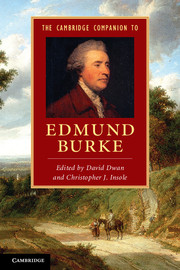Book contents
- Frontmatter
- Contents
- Contributors
- Acknowledgements
- Method of Citation
- Chronology
- Introduction Philosophy in Action
- 1 Burke’s Life
- 2 Burke, Enlightenment and Romanticism
- 3 Burke as Rhetorician and Orator
- 4 Burke’s Aesthetic Psychology
- 5 Burke on Law and Legal Theory
- 6 Burke on Political Economy
- 7 Burke and Religion
- 8 Burke and the Constitution
- 9 Burke and the Natural Law
- 10 Burke and Utility
- 11 Burke and the Ends of Empire
- 12 Burke and the American Crisis
- 13 Burke on India
- 14 Burke and Ireland
- 15 Reflections on the Revolution in France
- 16 Burke’s Counter-Revolutionary Writings
- 17 Burke in the United States
- Further Reading
- Index
- References
8 - Burke and the Constitution
Published online by Cambridge University Press: 05 December 2012
- Frontmatter
- Contents
- Contributors
- Acknowledgements
- Method of Citation
- Chronology
- Introduction Philosophy in Action
- 1 Burke’s Life
- 2 Burke, Enlightenment and Romanticism
- 3 Burke as Rhetorician and Orator
- 4 Burke’s Aesthetic Psychology
- 5 Burke on Law and Legal Theory
- 6 Burke on Political Economy
- 7 Burke and Religion
- 8 Burke and the Constitution
- 9 Burke and the Natural Law
- 10 Burke and Utility
- 11 Burke and the Ends of Empire
- 12 Burke and the American Crisis
- 13 Burke on India
- 14 Burke and Ireland
- 15 Reflections on the Revolution in France
- 16 Burke’s Counter-Revolutionary Writings
- 17 Burke in the United States
- Further Reading
- Index
- References
Summary
To all intents and purposes, Burke’s connection with the Whig party was over by May 1791. An emotional debate in the House of Commons indicated the final severance from Charles James Fox, and brought to a head disagreements that went back to early 1790. Thereafter, Burke was to suffer increasing sniping and criticism from other Whigs. In Appeal from the New to the Old Whigs he offered a sort of unapologetic valedictory in which he restated his understanding of Whiggism and vindicated his political consistency. He had reason to be concerned about both because he had done more than anyone else to provide a cogent intellectual justification for the party. He had joined the connection led by the Marquess of Rockingham in 1765 and quickly rose to become a leading advocate for its causes both in parliament and in print. He gave system and policy to their belief that the power of the Crown was increasing and ought to be diminished, and also provided firmer grounds for the connection cohering as a party. Hence, when by the early 1790s he was charged with abandoning everything he had held dear, it was essential to show that he at least remained true to Whig convictions even if those around him were losing theirs. This chapter examines Burke’s thinking about the constitution: its ideal forms, the threats it was exposed to, and the solutions proposed between the 1760s and 1780s.
The Mixed and Balanced Constitution
The constitution in the eighteenth century was the subject of persistent self-congratulation. The central leitmotif was provided by William Blackstone’s Commentaries. The separate systems of monarchy, aristocracy, and democracy were all liable to various disadvantages, but ‘happily’ Britain had mixed them together. The executive power was lodged in one man and so provided the strength associated with absolute monarchy. The legislature, however, was entrusted to ‘three distinct powers, entirely independent of each other’.
- Type
- Chapter
- Information
- The Cambridge Companion to Edmund Burke , pp. 104 - 116Publisher: Cambridge University PressPrint publication year: 2012
References
- 3
- Cited by

